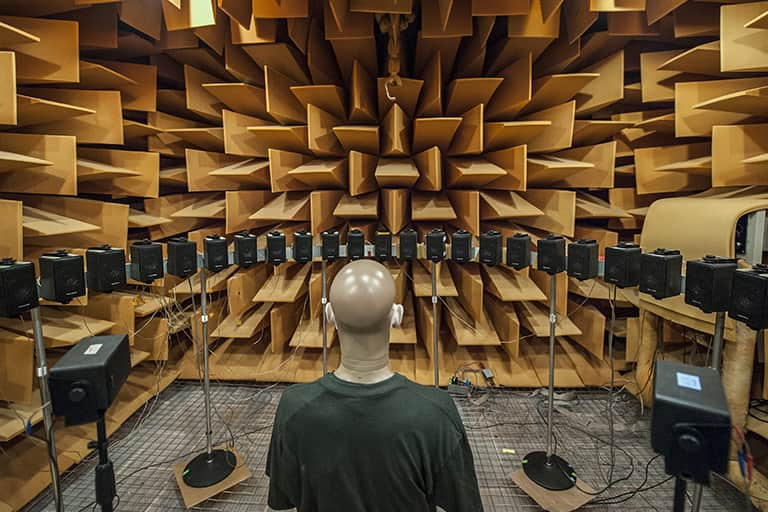Our research facilities are located in the ComArtSci and the Oyer Speech & Hearing buildings on the Michigan State University campus. There are eleven research laboratories and shared research spaces for faculty and student use. These communication labs have several sound-treated booths, an anechoic chamber, as well as a highly reverberant room. All laboratories are equipped with state-of-the-art hardware and software to enable researchers to conduct the highest quality research. The department also provides several opportunities, space and resources for students (undergraduate and graduate) to participate in research.
Research Laboratories
Analysis of Voice and Hearing Laboratory (AVAH Lab)
AVAH Lab, under the direction of Dr. Maryam Naghibolhosseini, specializes in the study of voice production, speech acoustics, and auditory sound processing. AVAH Lab mainly studies voice disorders in adults; and the goal is to determine the relationships between the voice production mechanisms, the generated speech sounds, and the perceived voice quality to improve voice assessment and treatment procedures. AVAH Lab uses machine learning and computational modeling to develop automated voice analysis methods that could improve the diagnosis of voice disorders.
Speech Outcomes in Neurogenic Communication (SONiC Lab)
The Speech Outcomes in Neurogenic Communication (SONiC) Lab, led by Dr. Thea Knowles, studies speech production in people with motor speech disorders (such as individuals with Parkinson’s disease) using a combination of acoustic, perceptual, and person-centered techniques. The overall goals of the SONiC Lab are to better quantify the characteristics of disordered speech production and identify mechanisms to inform and improve clinical speech management.
Research led by Dr. Bridget Walsh in the Developmental Speech Lab focuses on how stuttering and other speech disorders develop in young children. We are conducting a longitudinal study to map the development of neurological, behavioral, and experiential factors in young children who are stuttering to learn how these factors unfold over time and contribute to different stuttering outcomes in individual children—persistence or recovery. In parallel, we research the development of adverse impact in children who stutter. This research will bring novel, comprehensive insights into the development of stuttering leading to advances in diagnostic and intervention approaches.
The goal of the Language Learning Lab is to better understand how children with Developmental Language Disorder (DLD) learn new words and how best to support their learning through intervention. Current research includes a project investigating how the phonological structure of children’s vocabularies affects word learning and a project assessing comprehension of legal vocabulary by adolescents with and without DLD. Dr. Ron Pomper is the director of the Language Learning Lab.
The goal of the Lingo Lab is to better understand 1) how children with autism spectrum disorders learn language; 2) why some children learn language more easily than others, and 3) what can be done to help those who have difficulty. Dr. Courtney Venker is the Lingo Lab Director.
The LiTL Lab studies articulation forces and associated efforts with a goal of developing novel diagnostic and therapeutic approaches to improve communication in people with neurological disease or head & neck cancer. The LiTL Lab is underneath Dr. Searl's research.
The Spartan Stuttering Lab is dedicated to research, education, and service related to stuttering and other issues related to speech fluency. Research examines factors contributing to the experience of stuttering and ways that speech-language pathologists can help to reduce the impact faced by many people who stutter. The lab director is Dr. J. Scott Yaruss.
Speech, Language, & Neurocognition Lab (MSU Speech Perception-Production Lab)
Principal Investigator: Dr. Laura Dilley investigates the neurodevelopmental mechanisms of language/speech communication, social cognition, and neuroscience across both normative and atypical populations. We work at the intersection of clinical speech/language communicative sciences, cognitive sciences and disorders, neuroscience, and health communications. Our approach combines cutting-edge, interdisciplinary science with practical, applied, real-world knowledge.
Voice Biomechanics and Acoustics Laboratory
The Voice Biomechanics and Acoustics Laboratory studies all aspects of the voice mechanism and production, which includes a spectrum of topics, from the underlying physiology to the biomechanics and resultant acoustics of voice production to occupational voice disorders, upper airway disorders, and acoustic sound propagation.
The Voice and Speech Laboratory conducts research on the perception of voice quality and speech intelligibility in patients with a variety of speech, hearing and voice disorders, with a goal to understand and model these behaviors. The findings are applied to develop better tools for the assessment and rehabilitation of patients with voice/speech disorders, early detection of neurological disease and fitting or optimization of digital hearing devices. CSD's chairperson, Dr. Dimitar Deliyski, leads this lab.
